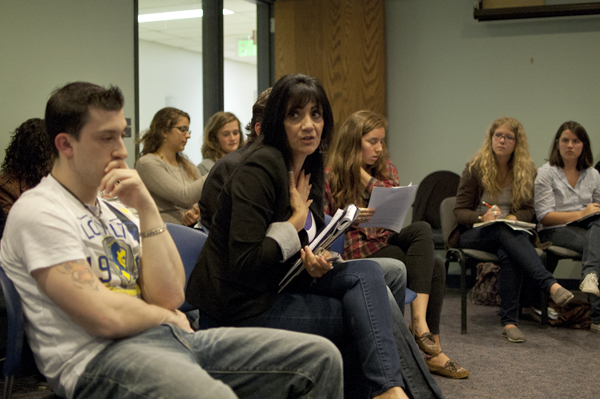

Talks concerning SUNY New Paltz food vendor Sodexo continued during an open discussion held on Thursday, April 26 in Student Union (SU) 407.
The discussion, titled “Digest This: Community Dialogue on Campus Dining,” was hosted by Students with a Common Interest in collaboration with professors and organizations such as Students for Sustainable Agriculture. The intent was to gather the community, allowing them to express their concerns with Sodexo and their ideas on how to make positive changes, the groups said.
“Out of this event, we hope that we can reach a consensus about a common vision and possible plan of action that is representative of all of our opinions and takes into account all of our individual concerns,” fourth-year international relations and Women’s Studies major Ashley Drzymala said.
The participants in the discussion spoke about the possibility of getting local restaurants as vendors, the positives and negatives of Sodexo as a “food service monopoly” on campus and including a requirement for local food options in the new contract with Sodexo or another vendor.
Sociology professor and member of the Campus Auxiliary Service (CAS) board Brian Obach said the end of the contract is a time to “make and secure some gains.” He said recommendations for a sustainable food policy at New Paltz were passed by the Sustainability Committee and endorsed by the Environmental Task Force.
The proposed policy requires the current 5 percent of locally produced food purchased and sold on campus to increase annually by 3 to 4 percent beginning in 2012. This would allow sustainable food purchases on campus to increase between 30 to 40 percent by 2020.
Obach said Sodexo is a multi-national company and therefore it is harder for them to adjust to a local food model.
“It’s not in their nature to want to deal with John or Jane the farmer from down the street,” Obach said.
In addition to ensuring local foods, Obach said the new contract must protect workers.
President of Civil Service Employees Association (CSEA) Sodexo Maria Mach said the company has formed a relationship with the workers through the union which developed over time. She said they have made some positive changes.
“They saw it, they took it and they moved forward,” Mach said.
She said she did not go to the meeting to advocate for Sodexo. However, she wanted people to consider the positive relationship Sodexo has made with their employees and the possibility of losing that relationship and the union if the food vendor is changed.
A student organizer said the employees work directly for the school. This allows them protection.
In response, Steven Deutsch, executive director of CAS, said CAS went out of the food service business 15 years ago, which is why multi-national companies like Sodexo have been the campus food service providers. Deutsch said if another company was to replace Sodexo, the union workers contract would still be in place.
Sen. Jonathan Espinosa proposed to allow more independent businesses to come on campus, like Tokyo Sushi.
Mach said this would create issues with union workers. She said unless union workers were employed at these independent businesses on campus, they would be outsourcing and there would be a decline in workers. However, she said “anything is possible and negotiable.”
Roberto LoBianco, a student organizer for the event, suggested removing Sodexo as the campus food service provider.
“Getting rid of Sodexo won’t be getting rid of workers,” he said.
LoBianco said more than a dozen universities kicked Sodexo off their campuses. He said the quality and price of the food off campus is far better than what’s offered on it, and instead of spending money to improve upon this issue, money is being spent on a $300,000 vending machine to be placed between the Student Union and Capen.
The student organizers encouraged students to participate in the open comment period at the beginning of each CAS meeting and voice their opinions to help make the changes they want to see.
During the CAS board meeting on Friday, April 27 members of Students with a Common Interest did participate in the CAS board meeting and found the board in violation of Article 7 and 103 of New York Public Officers Law when the board requested the students not to record the meeting.
In a letter to Deutsch, the Students with a Common Interest asked the CAS board to adhere to the Committee on Open Government’s model rules for public access to meetings, as outlined on the committee’s website allowing them to video record the proceedings for the benefit of all those unable to attend.
“What do we do from here?” Obach said. “Educate ourselves and do research. We need to not be ill informed, we need to know exactly what we are talking about, we need measurable reportable demands. Work with student representatives, identify your decision makers and get them to do what you want.”
